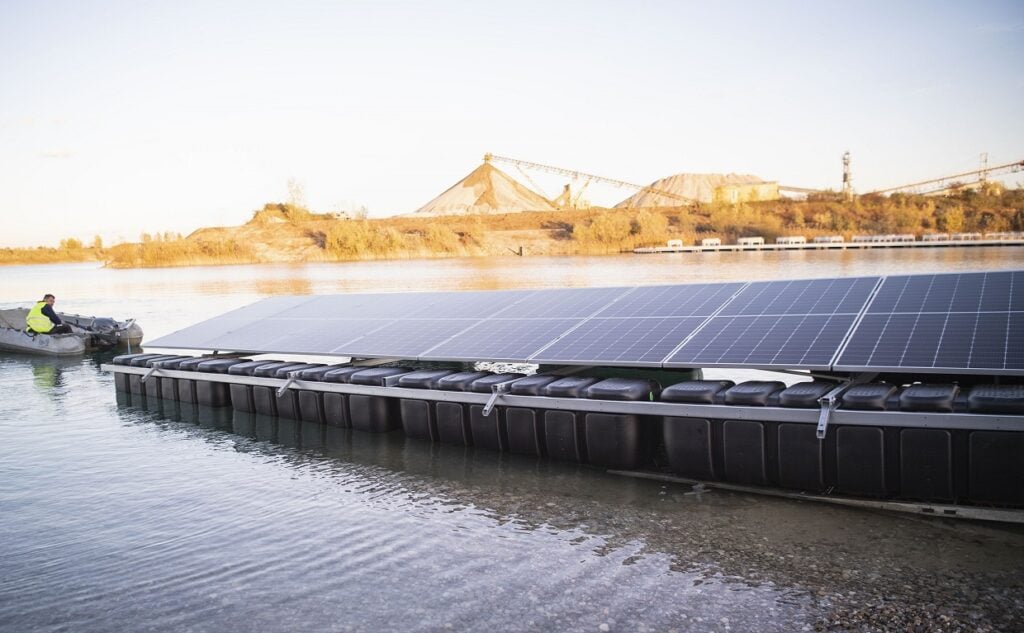
The Austrian Ministry of Economic Affairs and Energy has announced a “Made in Europe” bonus of 20% to government funding for PV and energy storage projects that use components made in Europe.
The funding will be available for new projects supported by the year’s second fundraising round, which is expected to take place on 23 June, and is aimed at tackling “unfair global competition”. While the ministry has not specified to which markets this refers, this terminology has been frequently used by manufacturers in the west to describe Chinese solar manufacturing, which is notably cheaper than its European and American counterparts.
Try Premium for just $1
- Full premium access for the first month at only $1
- Converts to an annual rate after 30 days unless cancelled
- Cancel anytime during the trial period
Premium Benefits
- Expert industry analysis and interviews
- Digital access to PV Tech Power journal
- Exclusive event discounts
Or get the full Premium subscription right away
Or continue reading this article for free
The news also follows Austria’s launch of a similar “Made in Europe” bonus to government subsidies offered to European solar component manufacturers last year. Last year’s subsidy bonus was also up to 20% of the total value of the project, and between the two announcements, there is now considerable support for both the manufacturing and deployment of European-made solar components in Austria.
“A central element of this is the ‘ Made in Europe’ bonus,” said Austrian minister of economic affairs and energy Wolfgang Hattmannsdorfer. “It represents regional added value and a clear commitment to Europe as an industrial location. This course is complemented by the strengthening of hydropower, the targeted expansion of electricity storage and photovoltaics.”
More specialised financing
Hattmannsdorfer’s comments come as Austria has outlined its government funding priorities for 2025, which include €60 million (US$68.1 million) for PV systems and storage, out of €70 million offered in total. The rest of the money will be split between hydropower plants of up to 2MW (set to receive €5 million), biomass plants of up to 50kW (set to receive €4 million) and wind turbines of up to 1MW (set to receive €1 million).
However, these figures are notably lower than the same totals last year, which saw the government commit €150 million towards renewable energy. Last year, solar systems received €135 million in direct government support, meaning both total investment in renewable energy in general, and investment in solar in particular, has roughly halved since last year.
“We must use public funds more specifically and effectively,” explained state secretary for energy Elisabeth Zehetner, as Austria’s financing approach has shifted from large-scale capital to supporting specific elements of the supply chain, such as manufacturing.
“That is why we are gradually aligning our funding policy more strongly with system service and efficiency – so that every subsidised kilowatt-hour also makes a real contribution to the energy transition.”
The government also announced a “major development” to come in the fourth quarter of this year, in the form of amendments made to the Electricity Investment Grant Ordinance 2025 (EAG), the legislation under which these government investments are to be made. From the fourth quarter onwards, only PV systems co-located with storage projects will be eligible for government subsidies, there will be no funding provided in times of negative prices and the government will have a “stronger focus” on hybrid power plants.
Many of these mechanisms suggest that delivering reliable power, rather than simply building sheer volume of new capacity, is a priority for Austria, as it looks to invest in storage and hybrid projects that can be perceived as less variable forms of power generation than pure-play solar. Curtailment is a significant problem in Austria, with independent transmission system operator Austrian Power Grid reporting that the country curtailed 57.4GWh of electricity in 2024, and that in the first 29 days of 2025 alone, a further 4.8GWh of power was curtailed.
This echoes similar concerns expressed across Europe; earlier this month, José Andrés Visquert, global head of grid at renewables developer BayWa r.e., told PV Tech Premium that in Europe, “one of the biggest problems we see is that the speed of grid expansion is much slower than the expansion of renewables penetration.”
At this year’s Intersolar Europe event, Solar Media will host a panel discussion on European manufacturing at 3:30pm on Wednesday 7 May in hall A2, booth 159. Speakers include Gaëtan Masson of the Becquerel Institute and Edd Crossland of Oxford PV. Interested attendees can register to attend the panel for free here.






